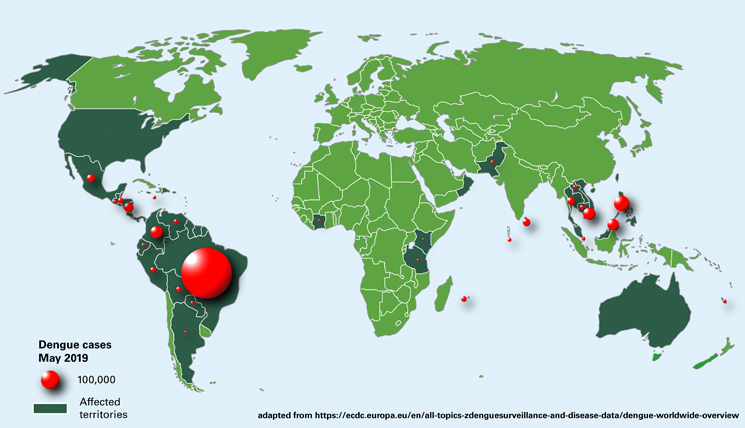In spring 2019, the Pan American Health Organization (PAHO) called upon countries in Latin America and the Caribbean to prepare for possible outbreaks of dengue fever. Since the 1980ies, there were dengue virus epidemics in this region, at intervals of some years. The last one occurred in 2013, with over two million disease cases. This year, the registered cases have again increased and sound a note of caution. In 2018, in North and South America, in total 560,586 dengue virus infections were reported, 336 people died. Until beginning of June of this year, there were already more than 724,000 cases (including 275 deaths). Also in Southeast Asia and the West Pacific, the number of cases of dengue fever is increasing.
Before 1970, only nine states were affected by dengue fever. Nowadays, the infectious disease is endemic in over 100 countries. Latin America, Southeast Asia and the West Pacific are mostly affected. According to current estimations by Bhatt et al., there are 390 million dengue infections per years, of which 96 million present clinical symptoms.
Dengue viruses are transmitted by mosquitos to persons and cause flu-like symptoms, partly accompanied by life-threatening complications. The spread of the viruses is closely linked to that of the mosquitos. The latter is facilitated by factors such as the climate change, the growth of the cities, and the increasing travel activities of people who carry insects in their luggage without knowing and thus import them into regions where they are usually not endemic.
The diagnosis of dengue virus infection has turned more complex over the last years due to the occurrence of infectious diseases with similar symptoms, such as chikungunya or Zika virus infections. Specific laboratory diagnostic analyses are hence gaining importance. Within the first days after onset of symptoms, early biomarkers such as the virus-specific protein NS1 may indicate a dengue virus infection. After some days, the patients develop specific antibodies against the virus, which can be detected by means of ELISA or immunofluorescence tests.
EUROIMMUN offers products to support the diagnosis of dengue virus infections in all stages of the disease.
For the treatment of dengue virus infections, there is to date no specific antiviral therapy. In addition to the prevention of mosquito bites, vaccines are available in many of the countries where the virus is endemic.

